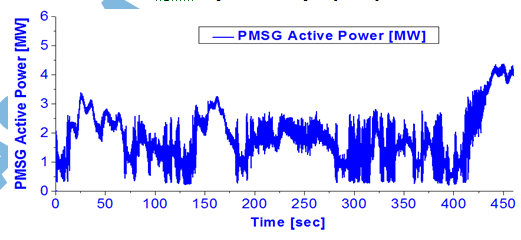ABSTRACT:
This paper presents Permanent Magnet Synchronous
generator (PMSG) based a variable speed wind turbine systems including energy
capacitor system (ECS). The ECS is the combination of electric double layer
capacitor (EDLC) known as super capacitor and power electronic devices for wind
power application with its detailed modeling and control strategy which can
supply smooth electrical power to the power grid and makes the system better
stable and reliable. As generated power from wind fluctuates randomly, the
objective of this control system is to select a line power reference level and
to follow the reference level by absorbing or providing active power to or from
ECS to smooth output power fluctuation penetrated to the grid and to keep the
wind farm terminal voltage at a desired level by supplying necessary reactive
power. The performance of the proposed system is investigated by simulation
analysis using PSCAD/EMTDC software.
KEYWORDS:
1.
Variable speed wind generator
2.
Permanent Magnet Synchronous
generator (PMSG)
3.
Energy Capacitor System (ECS)
SOFTWARE: MATLAB/SIMULINK
BLOCK DIAGRAM:
Fig.
1. Model System
EXPECTED SIMULATION RESULTS:
Fig.
2. Response of real wind speed data [case-I]
Fig.
3. Response of PMSG generated Active Power [case-I]
Fig.
4. Grid terminal voltage without & with ECS [case-I]
Fig.
5. Grid Power with/without EDLC and EDLC power [case-I]
Fig.
6. Grid Active Power without and with EDLC [case-I]
Fig.
7. EDLC active Power [case-I]
Fig.
8. EDLC energy [case-I]
Fig.
9. Comparison with SMA and ECS
Fig. 10. Response of Wind speed
[case-II]
Fig. 11. PMSG generated Active
Power [MW] [case-II]
Fig. 12. Grid Active Power
without and with EDLC [case-II]
Fig. 13. EDLC active power
[case-II]
Fig. 14. EDLC energy [case-II]
Fig. 15. Grid terminal voltage
without & with ECS [case-II].
Fig. 16. Frequency deviation of SMA, ECS
& without ECS [case-I].
CONCLUSION:
The simulation results show
that the quality of the terminal voltage and output power penetrated to the
grid is not good but continuously varying without ECS system. Besides, when we used
ECS system, the terminal voltage and grid power is almost constant and quality
of voltage and power is excellent. So, using ECS system smoothed power can be
supplied to the grid by charging and discharging of EDLC. By using low pass filter
to calculate line power reference instead of SMA, EMA makes the system very
simple, compact and cost effective. Therefore, it can be concluded that this
proposed system can be applied effectively in power systems to generate high quality
electrical power from the natural fluctuating wind.
REFERENCES:
[1] G. annual report, 2014; world wind energy association.
[2] Niu Jiangang, Baotou, “Investigation on the properties of fly
ash concrete attacked by a Pseudo-capacitance Faradaic electrochemical storage
with electron charge-transfer, achieved by redox reactions, intercalation or
electrosorption. Rain,” IEEE, Conference, ICETCE, Lushan, DOI. 10, pp. 2335 –
2339, 22-24 April 2011.
[3] Harden F, Bleijis JAM, Jones R, Bromely P, Ruddell AJ, “Application
of power-controlled flywheel drive for wind power conditioning in a wind
/diesel power system,” Ninth international conference on Electrical Machines
and Drives, Canterbury, paper no. 468, pp. 65-70.
[4] Senjyu T., Sakamoto R., Urasaki N., Funabashi T. Fujita H., SekineH.,“Output
power leveling of wind turbine Generator for all operating regions by pitch
angle control,” Energy Conversion, IEEE Transactions, Vol. 21, pp. 467 -
475, 2006.
[5] Ali MH, Murata T, Tamura J, “Minimization of fluctuations of
line power and terminal voltage of wind generator by fuzzy logiccontrolled SMES,”
international review of Electrical engineering, vol. 1, pp. 559-566,
2006.















